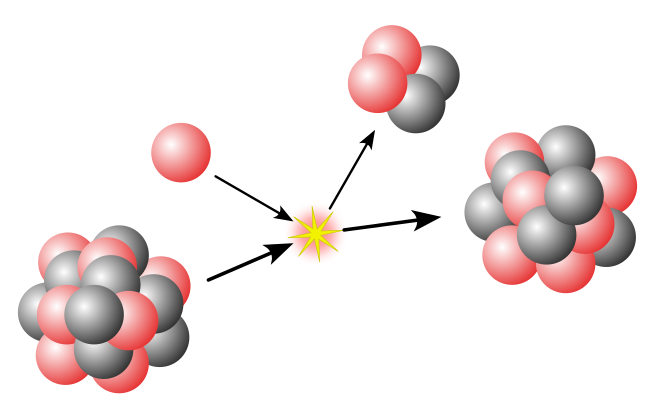
Main Difference
The main difference between Isotope and Isomer is that the Isotope is a nuclides having the same atomic number but different mass numbers and Isomer is a one of several species (or molecular entities) that have the same atomic composition (molecular formula) but different line formulae or different stereochemical formulae and hence different physical and/or chemical properties.
-
Isotope
Isotopes are variants of a particular chemical element which differ in neutron number. All isotopes of a given element have the same number of protons in each atom. The term isotope is formed from the Greek roots isos (ἴσος “equal”) and topos (τόπος “place”), meaning “the same place”; thus, the meaning behind the name is that different isotopes of a single element occupy the same position on the periodic table.
The number of protons within the atom’s nucleus is called atomic number and is equal to the number of electrons in the neutral (non-ionized) atom. Each atomic number identifies a specific element, but not the isotope; an atom of a given element may have a wide range in its number of neutrons. The number of nucleons (both protons and neutrons) in the nucleus is the atom’s mass number, and each isotope of a given element has a different mass number.
For example, carbon-12, carbon-13 and carbon-14 are three isotopes of the element carbon with mass numbers 12, 13 and 14 respectively. The atomic number of carbon is 6, which means that every carbon atom has 6 protons, so that the neutron numbers of these isotopes are 6, 7 and 8 respectively.
-
Isomer
An isomer (; from Greek ἰσομερής, isomerès; isos = “equal”, méros = “part”) is a molecule with the same molecular formula as another molecule, but with a different chemical structure. Isomers contain the same number of atoms of each element, but have different arrangements of their atoms. Isomers do not necessarily share similar properties, unless they also have the same functional groups. There are two main forms of isomerism ( or ): structural isomerism (or constitutional isomerism) and stereoisomerism (or spatial isomerism).
-
Isotope (noun)
Any of two or more forms of an element where the atoms have the same number of protons, but a different number of neutrons within their nuclei. As a consequence, atoms of isotopes will have the same atomic number but a different mass number.
-
Isotope (verb)
To define or demonstrate an isotopy of (one map with another).
-
Isomer (noun)
Any of two or more compounds with the same molecular formula but with different structure.
-
Isomer (noun)
Any of two or more atomic nuclei with the same mass number and atomic number but with different radioactive properties.
